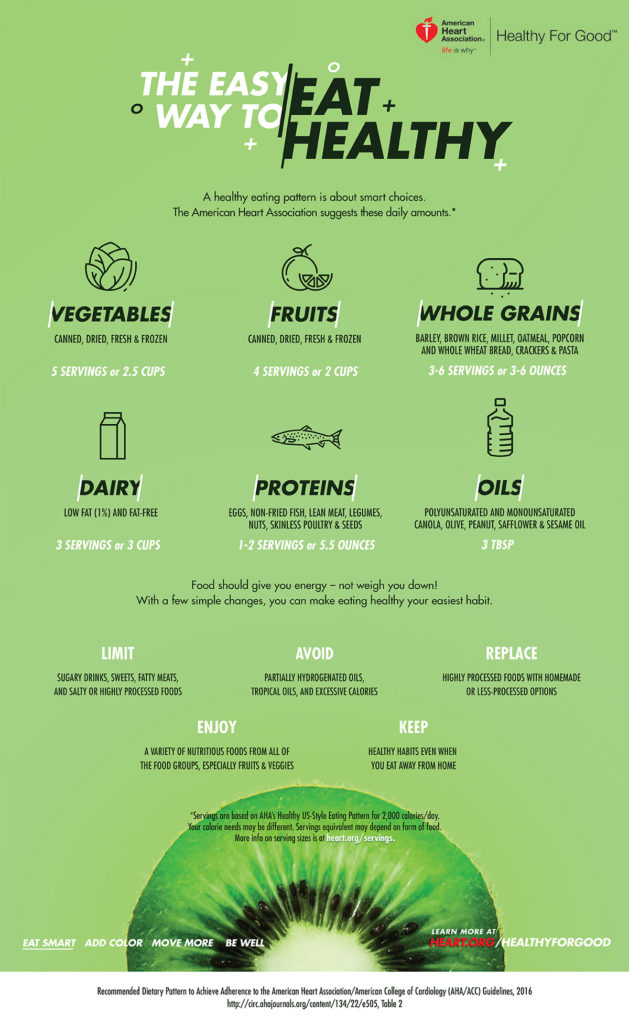Every year on September 29th, we celebrate World Heart Day. Cardiovascular Disease (CVD) claims 17.9 million lives globally each year, so the World Heart Federation created the campaign to educate and encourage individuals to improve their heart health.
Over a lifetime, the heart beats about 2.5 billion times! Like all our muscles, it’s important to keep it strong and healthy.
In honor of World Heart Day, here are some tips to help keep your heart healthy:
- Stop smoking. It’s the number one way to immediately improve your heart health. Talk to your doctor if you need help kicking the habit.
- Know Your Healthy Weight. Everybody is different, so it’s important to know your ideal caloric intake for your height and weight. Excess weight can put excess strain on your heart.
- Maintain Your Healthy Weight. Keeping off even 3-5% of body weight can help lower blood pressure if you’re overweight. Staying active daily — even just a brisk walk — can help keep the pounds off.
- Limit Salt. The Heart Foundation recommends less than 2,000 mg of sodium daily. Too much salt can lead to high blood pressure, which can cause a stroke, heart attack, and more. Read food labels.
- Eat Your Fruits and Vegetables. Eating more fruits and veggies can never hurt you — unless it’s fried, of course. The American Heart Association recommends making half of your diet intake fruits and vegetables. See infographic below.
- Eat More Chicken (and Fish). Chicken and fish often have less saturated fat than red meat, which is better for your heart. Eating fish with omega-3 fatty acids (like salmon) can reduce cardiovascular disease risk.
- Limit Red Meat to Once a Week or Less. Red meats have more cholesterol than other meats like chicken or fish. Since cholesterol can worsen heart disease worse, try to limit it and choose lean cuts like sirloin.
- Eat More Soluble Fiber. Soluble fiber lowers cholesterol and helps manage blood sugar. Consider eating foods like whole grains, berries, flaxseed, and beans to avoid the “crash” of eating less fibrous foods.
- Increase Omega-3 Fatty Acids in Your Diet. You can choose either foods or prescribed supplements to get omega-3 fatty acids in your diet. It may help reduce blood pressure, lower triglyceride levels, and protect the heart by slowing plaque growth and reduce arrhythmia.
- Add Oatmeal to Your Diet. Oatmeal is fiber rich and contains omega-3 fatty acids, folate, and potassium. Eating oatmeal may also help lower levels of LDL (bad) cholesterol.
- Follow Your Health Plan and Take Your Medications. Work with your doctor to create a plan that works for you and stick with it. This includes taking any and all prescribed medications for health conditions like high blood pressure.
- Exercise Regularly. A minimum of 40 minutes for 3 to 4 times a week is ideal for the best cardiovascular health results. Make it fun! Grab a friend and get outdoors on a beautiful day.
- Do Different Types of Exercises. Keep your body guessing. Mix up your fitness routines with cardio, strength training, and stretching. All are important for good health.
- Limit Alcohol. Women should have no more than one drink per day. Men should consume no more than two alcoholic beverages per day. Too much alcohol can raise triglyceride levels.
- Limit Sugar. The recommendation is no more than 6 teaspoons a day for women and 9 teaspoons a day for men. Read labels to see where sugar is hiding, including breads and condiments. Excess sugar intake is linked to certain cancers, heart disease, and obesity.
- Switch to Olive Oil. Olive oil is full of monounsaturated fats, lowers LDL (bad) cholesterol. It may help reduce risks of developing heart disease.
- Monitor Your Cholesterol. Have your cholesterol checked at least every five years. You’ll want to do this more if your doctor has discovered any issues like high cholesterol in the past.
- Watch Your Blood Pressure. High blood pressure can cause heart disease, kidney disease, and it has been linked to dementia. Check yours regularly.
- Mitigate Stress. Stress can raise blood pressure and lead to elevated levels of the hormones adrenaline and cortisol in the body. Find ways to relieve stress — like deep breathing— that work for your lifestyle.
- Practice Good Oral Health. Good dental hygiene includes brushing and flossing your teeth daily. Those who have gum disease often have risk factors for heart disease.
- Donate Blood. At least every six months, consider donating blood. Studies have shown that people who donate regularly suffer fewer heart attacks.
- Be Social. Studies show that people who stay in regular contact with family and friends have fewer heart problems.
- Get Enough Sleep. Adults typically need 7 to 9 hours of sleep a night. Sleep deprivation is not only bad for your heart and blood pressure, but it also raises risks for obesity, diabetes, and depression.
- Read and Understand Food Labels. Just because a food product is labeled as low-fat or healthy doesn’t mean it is. “Partially hydrogenated” or “hydrogenated” means trans fats, which aren’t good for the heart. Monitor sugar and salt amounts per serving and know how many servings are in the package.
- Choose Natural Over Processed. In general, the less processed a food is, the healthier it is. Think of “whole foods” as foods that are naturally grown like sweet potatoes, bananas, and spinach.
- Choose Baked Over Fried. Think baked buffalo wings, baked fries, and crunchy baked chicken instead of automatically tossing those food items into a fryer.
- Minimize the Risks of a Sedentary Lifestyle. Sitting for too long can lead to blood clots. You’ll want to be mindful of the length of time you sit every day and also when you travel. Try to get up and stretch to avoid a blood clot forming.
Cardiovascular Disease (CVD) Statistics
- An estimated 17.3 million people worldwide die of CVD every year
- Approximately 1 in every 4 deaths in the U.S. is caused by heart disease
- Heart disease is the leading cause of death for men and women
- Someone has a heart attack every 40 seconds in the U.S.
The heart is an amazing part of the human body that works without us even thinking about it — until a heart issue pops up. Poor genes aren’t the only reason people have heart concerns. Much of heart health is under our control from eating habits to exercising; make healthier heart choices.


